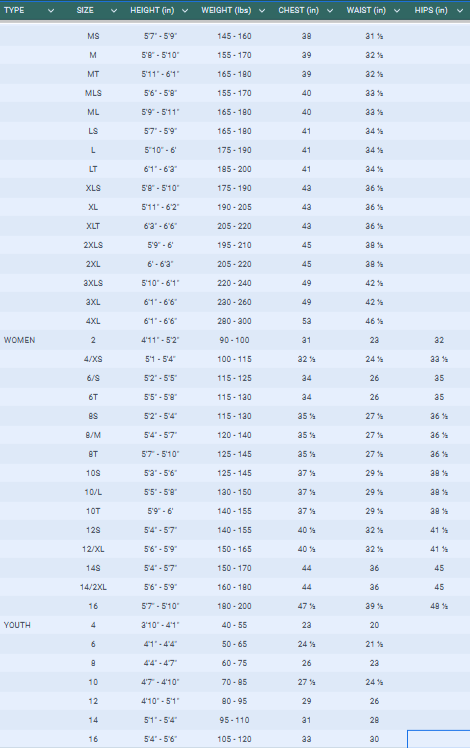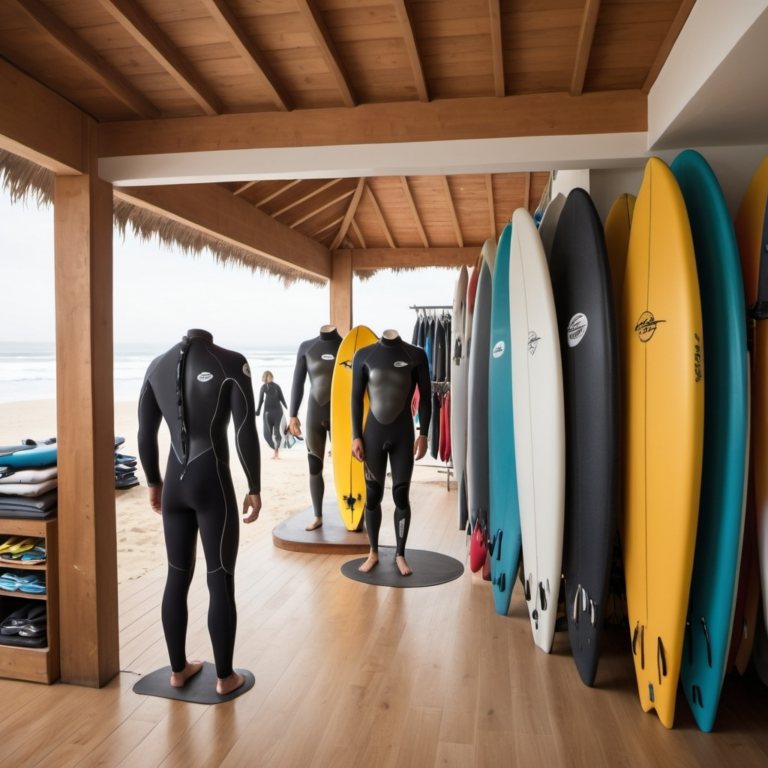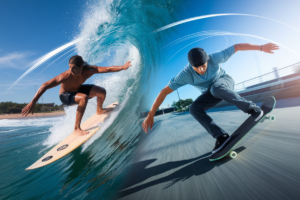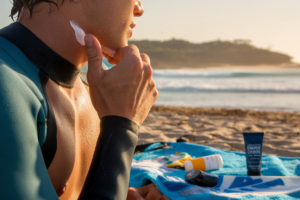Renting equipment when you are learning to surf is a great way to find out if you like the sport without having to buy your own gear.
When I learned to surf as a teenager, I rented equipment several times before I bought my own wetsuit and surfboard.
Just the other day I was asked, “What do I need to know when renting a surfboard and wetsuit?”
I did some research and have summarized my experiences when renting surfing equipment at various locations around the world.
Most surf shops make the rental process quick and easy and will even help you strap the surfboards to the top of your car!
I have created a giant list of all the questions you might have about renting surfboards and wetsuits below.
1. What is the Cost to Rent a Surfboard?
Although the cost to rent a surfboard will vary based on the amount of time you plan to spend surfing, the average price in most locations in North America is around $20-$30 per day.
The most common rental period or time duration for surfboard rentals are: hourly, half-day or full day. The cost usually gets cheaper the longer you rent the surfboard.
Renting surfboards when travelling can be more cost efficient and convenient because you don’t have to pay airline fees or transport your surfboard from place to place.
2. What is the Cost to Rent a Wetsuit?
Wetsuit rentals are usually cheaper than surfboard rentals and will cost you approximately $15-20 per day.
Wetsuit rental costs will vary and most surf shops will offer a rental package deal if you are renting a surfboard as well.
If you are surfing in a climate that requires booties and/or gloves they may be included in the wetsuit rental cost or be an additional $5 per day.
3. How Do I Transport Rental Surfboards to the Beach?
The best mode for transporting rental equipment will depend on how far away the surf beach is located from the surf rental shop.
In most surfing areas, rental shops are located in close proximity to the beach, which makes it convenient for transporting surf gear. If you want to walk, you can just rent a surfboard and carry it down to the sand or across the road to the beach.
In areas that require transport by car, most surf shops will provide straps or soft racks so you can affix the surfboards to the top of your car. Staff will assist if needed so don’t be afraid to ask for help.
If you need some tips, click on the heading to read my article, titled 17 Tips on How to Strap Surfboards to Your Car.
Another option is transporting a rental surfboard by bike. This will be an added cost, but you can also rent bikes in some areas with side mounted surfboard racks. This can be a great way to get some fresh air and exercise and avoid busy parking lots.
4. Can You Rent Surfboards without Previous Surfing Experience?
Although you can rent surfboards if you don’t have previous surfing experience, most surf shops will recommend that you take a lesson before going surfing for the first time.
The ocean is unpredictable and it can be dangerous for beginner surfers if you are unaware of the hazards like crashing waves, submerged rocks and rip currents.
Taking a lesson will increase the chances of catching a wave your first time out. As well, an instructor will give you tips, take you to a good beginner beach and keep you safe. I highly recommend taking a lesson your first time surfing.
If you wanna know more about surf lessons, check out this article: Average Cost of Surfing Lessons
5. Can Surf Shops Refuse Rentals?
Yes! Surf shops may refuse rentals during times of high surf advisory because the conditions are too dangerous.
Rental shops don’t want to send people out in wave conditions that will increase the likelihood of injury.
As well, surf shops don’t want to rent gear when there is an increased risk of surfboards becoming broken and damaged.
In some tourist areas, rental shops will refuse overnight rentals to people that are camping. Returning rental equipment each day reduces the likelihood of theft because it is difficult to lock up or secure surfboards when you are staying in a tent.
6. Will I have to Pay a Deposit to Rent Surf Equipment?
Most surf shops will expect you to pay a deposit when renting surf equipment.
The deposit is charged to your credit card and held by the surf shop during the rental period to cover theft and/or breakage. Once the surf equipment is returned and inspected, the deposit charges are reversed back onto your credit card.
I have rented surfboards from surf shops that don’t require deposits but they end up keeping a photocopy of a government issued ID card like a Driver’s License instead.
7. How Old Do You Have to be to Rent Surfboards and/or Wetsuits?
Most surf shops have a minimum age limit for renting surfboards and/or wetsuits and will not rent equipment to minors.
The minimum age to rent surf equipment at most surf shops is 18 years old.
Kids are welcome to rent surf equipment but they must be accompanied by an adult or guardian.
Surf shops want to reduce liability and make sure that all minors are under the supervision of a parent or guardian.
8. Do I need to Make a Reservation to Rent a Surfboard or Wetsuit?
At most surf shops you don’t need to make a reservation to rent a surfboard or wetsuit. Most days, you can just show up and rent surf gear.
For larger groups, it is recommended to make a reservation or phone the surf shop in advance.
This ensures that they have all the gear that your group requires. Surf shops will want to confirm wetsuit sizing in advance so you should know the height and weight or wetsuit size of everyone in your group.
In addition, they will want to confirm what type of surfboards your group are expecting to rent in order to make sure they can meet your needs.
9. Do I have to Disclose My Height & Weight to Rent a Wetsuit?
Everytime I have rented wetsuits for myself, friends or family, the surf shop will ask for your height and weight.
It can be an uncomfortable situation for some people and although it can’t be avoided entirely, it will go more efficiently if you know your wetsuit size in advance.
If you are new to surfing or don’t know much about wetsuit sizing, check out the sizing chart below.

As well, you can phone the surf shop in advance and ask if they have your size. That way you will know in advance if they have a wetsuit that is right for you.
If you don’t want to go through the rental process, you can always just buy your own wetsuit. If you want some helpful tips, click on the link to check out my post titled The Complete Beginners Guide to Buying a New Surf Wetsuit.
10. Best Surfboard to Rent for Beginners?
The most common rental surfboard, which is also great for beginners, is a soft top surfboard. Soft top surfboards, also called foam surfboards or foamie, typically have a soft deck or top made out of foam and a hard bottom.
Foam surfboards are great for beginners because they reduce the risk of injury. If you get hit by your surfboard or you collide with another surfer, the foam surfboard is a lot softer than traditional surfboards that are made out of fiberglass or epoxy.
As for surfboard sizing, most surf shops will suggest a few different sizes based on your height and weight, surfing experience and ability.
I have found that most surf shops are very helpful and knowledgeable about the board that is right for you. They want you to catch waves so just go with their recommendations if you aren’t sure on what size board to rent.
11. Best Wetsuit to Rent for Beginners
The best wetsuit is the one that fits and keeps you warm.
Don’t worry about what it looks like or anything else about the wetsuit you are renting. If it is sized correctly and it is thick enough to insulate you from the cold ocean water, then you are good to go.
Most surf shops that rent wetsuits have lots of experience and are experts at wetsuit sizing. Keep in mind that they want you to be comfortable and have fun so they have a vested interest in getting you the right wetsuit.
12. Should You Pee in a Rented Surfing Wetsuit?
I hate to be the person to break it to you, but you should just assume that most people have peed in the surfing wetsuit you are about to rent.
Don’t be too alarmed because surf shops rinse and or wash all wetsuits between every rental.
That being said, it is totally acceptable to pee in a rented surfing wetsuit. You have paid good money, so go ahead and relieve yourself as often as you like.
13. What kind of Surfboards Do Surf Shops Typically Rent?
Although the rental surfboard selection isn’t the same in all parts of the world, you will find that most surf shops have a wide selection of rental boards.
Surf shops usually have a wide selection of larger surfboards that are big and stable (8-9 feet long), which are great for beginners. You can also rent skim boards, body boards and shorter surfboards.
Surf shops will usually rent surfboards that are made out of foam or epoxy because they are more durable than other common surfboard construction materials like fiberglass.
Don’t forget that surf shops usually have a selection of rental surfboards that work for the local waves so you can usually trust their recommendation.
14. What Type of Wetsuits Do Surf Shops Usually Rent?
Full suits or steamers, which are wetsuits that have full length arms and legs are the most common type of wetsuit for rent. Surf shops will usually have a few different styles and a full range of sizes to fit almost everyone.
Since most people will be surfing in the area close to the surf shop they rented from, the wetsuits will have the appropriate thickness to keep you warm in the ocean.
Surf shops will have a wide range of sizing and will probably give you an opportunity to try it on if you aren’t sure about sizing.
You may want to bring a bathing suit to the surf shop so you are prepared to try on wetsuits. Making sure you have the correct size is worth the effort because an ill fitting wetsuit will be uncomfortable and may cause chafing.
15. What Should I Wear Under a Rental Wetsuit?
Regarding what to wear under a rental wetsuit, you have a bunch of different choices. You can wear: nothing, a bathing suit, underwear, a sports bra, board shorts, a rash guard, speedo and/or rash shorts.
Going naked underneath a rental wetsuit is totally acceptable but you may be uncomfortable thinking about all the other people that may have used your rental suit in the same manner.
Wearing a bathing suit under a wetsuit is the most common and probably the most sanitary. It is comfortable, functional and makes changing really easy. And as an added bonus, when you remove your wetsuit you are ready for the beach!
Boys and men should know that baggy shorts can become bunched up under a wetsuit and become uncomfortable. Rash shorts or speedos, which are made out of tight fitting lycra are a good layer to wear instead.
If you are worried about chafing or getting a rash, feel free to click the on the link to be redirected to my post titled, How Do Surfers Stop Wetsuit Chafing: 10 Battle Tested Tips
16. What Happens if I Rip or Tear the Rental Wetsuit?
If your rental wetsuit becomes damaged during the rental period it is always best to contact the rental company. That way they can make an assessment and let you know the next steps.
You may be charged a small fee but most shops are pretty understanding if the damage was due to regular wear and tear. Also, small rips and tears are fairly easy and inexpensive to fix. If you are close by the shop, you may be able to just pop in and exchange for another wetsuit.
If it’s just a small repair, you can also do it yourself. Follow this guide for the Best Wetsuit Repair Kits. This is the best way to avoid any argument with the surf rental shop.
If you have caused significant damage to the rental wetsuit because you hung it too close to a beach fire or you unknowingly dragged it behind your car for a few miles, you may want to read your rental agreement to find out the next steps.
17. What Happens if the Rental Surfboard gets Damaged, Lost or Stolen?
Most surf shops won’t charge you very much for a small ding or minor surfboard damage related to normal wear and tear.
However, you should expect to get charged a fee if there is significant damage or damage that can be attributed to poor handling or negligence like surfboards flying off your car during transport.
As well, you will be charged up to the full value of the surfboard if it is stolen or lost. If you are unsure about the rules related to damage or loss, just ask!
As well, make sure to disclose any damage to the surf shop because they are usually more understanding if you are upfront. Most rental companies aren’t looking to profit off damaged boards but they will want to cover their repair costs.
A few helpful tips to reduce the risk of damage or loss:
-
Make sure surfboards are attached correctly to the roof of your car (most surfboards become damaged during transport)
-
Don’t leave surfboards unattended
-
Handle surfboards with care and report any damage to the surf shop
18. What Happens if You Are Late to Return Rental Surfboards & Wetsuits?
If you are late to return rental surfboards & wetsuits you will most likely be charged a late fee.
Because the rental cost is determined based on the length of the rental period, you will have to pay more if you keep it longer.
As well, hourly and half-day rentals is a common rental period and surf shops want to get the gear back so they can wash and hang it to dry so it is ready for the next day.
If you expect to return the surfing gear late or after the rental period has expired, just give the surf shop a call and let them know.
19. What if I Want to Shorten or Extend the Rental Period?
It is totally acceptable to return surfing gear early or before the end of the rental period. But if your rental period was for a short time like an hour or two, don’t expect a refund because you brought it back 15 minutes early.
That being said, if you rented a surfboard & wetsuit for a number of days and you are bringing it back early, some surf shops will refund you the unused portion of the rental period.
If you want to extend your rental period, you should call the surf shop to inquire about an extension.
20. Can I Exchange a Surfboard if I Don’t Like the One I Rented?
Most surf shops will let you exchange a rental surfboard if you are unhappy with the one you rented.
That being said, if you have only rented a surfboard for a short time (ex. 1-2 hours) you may not have time to travel to the shop, exchange the surfboard and return to the beach within the rental period.
If your rental period is longer (ex. multi-day) you should be able to exchange surfboards during that time. Just ask the surf shop about their exchange policy if it is important to you. You will be able to try a few different surfboards if the surf shop has a good exchange policy.
In Mexico and Hawaii, I rented surfboards for two week long rental period and I exchanged surfboards several times. It was very convenient because I was able to try a few different boards and always have a surfboard that was appropriate for the conditions.
21. Can You Rent Wetsuits for Kids?
Surf shops usually carry a good selection of rental wetsuits for kids. Renting a wetsuit for your child is a great way to get them exposed to surfing without making a big investment.
Even though kids wetsuits are smaller than adult wetsuits, they aren’t always cheaper to rent. In most cases they are about the same price.
Because kids have poor thermoregulation and get cold faster than adults, make sure to ask the surf shop whether booties, gloves or a hood are recommended.
If your child is new to the sport of surfing, taking a lesson is a great way to be introduced to the sport while being supervised by an instructor.
If your child can’t swim or needs to wear a life jacket or PFD you should click on the links and consider reading two other posts I have written:
11 Must-Knows if You Want to Learn to Surf But Can’t Swim
Wearing a Life Jacket or PFD When Surfing: 9 Things To Know
22. Do Surf Shops Have Cancellation Policies for Rentals?
Yes, most surf shops have cancellation policies if you want to cancel your rental reservation.
Generally, you won’t be charged a fee if you cancel your reservation at least 48 hours before your scheduled time but make sure to check with each surf shop individually because actual cancellation policies may vary.
23. Difference between a Surfboard Rental and a Surfboard Demo?
Surfboard rentals are for people just looking to rent a surfboard for a specific time period in order to catch some waves.
Surfboard demos are for people looking to rent a specific high end surfboard in order to test it out and decide if they want to make a purchase. They are usually more expensive than surfboard rentals because the demo surfboards are higher end quality.
24. Can The Rental Fee Go Towards the Purchase of Surfing Equipment?
Some surf shops, but not all, will allow you to put a portion or your rental or demo fee towards the purchase of a new wetsuit or surfboard.
Surf shops want to reward loyalty and help stoked surfers make the leap to owning their own equipment.
For surfers, you may have tried a wetsuit or surfboard that works great or fits you well and a discount can help make a purchasing decision.
25. What Should You Pack for the Beach?
Make sure to check the weather in advance so you know what to pack.
Because you will be surfing and spending hours at the beach, you should pack snacks, water, surf wax, sunscreen, bathing suit, a hat and a towel at the very least.
The weather can be unpredictable and the temperature near the ocean may be colder than you expect so it is always good to pack some extra layers.
Best of Luck and Happy Surfing!




